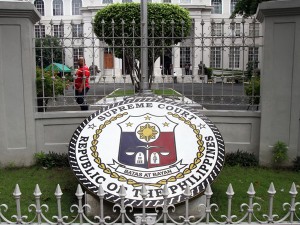New SC rules to decongest jails, uphold right to bail
MANILA, Philippines—The Supreme Court’s new guidelines aimed at decongesting the country’s jails by enforcing the right of accused persons to bail and to a speedy trial went into effect Thursday.
The guidelines, adopted by the full court on March 18, shall also apply to persons currently under detention and awaiting trial.
The high court justices said they recognized the “need to effectively implement existing policies laid down by the Constitution, the laws and the rules respecting an accused’s rights to bail and to a speedy trial in the context of decongesting our detention jails and humanizing the condition of detained persons pending the hearing of their cases.”
The guidelines also authorize the service of subpoenas and other judicial notices through electronic mail or mobile phone, the mechanisms for which were launched on Wednesday by the high tribunal and the Departments of the Interior and Local Government and of Justice.
Under the guidelines, an accused may move to have his or her bail amount set immediately and the executive judge must swiftly raffle off the case to a regular court.
Article continues after this advertisementA motion by an accused seeking reduced bail shall be prioritized. A court order fixing the amount of bail would not be subject to appeal.
Article continues after this advertisementFor serious crimes, judges have 48 hours to set bail after hearing witnesses for both the prosecution and defense.
The Supreme Court also added new time limits to the provisions of Republic Act No. 8493, or the Speedy Trial Act of 1998.
The guidelines require that a case be raffled off to a trial court three days after the filing of the criminal information. The arraignment must take place within 10 days from the date of raffle. The trial must take place within 30 days after the pretrial conference.
Regular trials must be completed in 180 days, while trials on judicial affidavits must be resolved after 60 days.
The case against an accused may be dismissed for denial of the right to a speedy trial in the event the time limits are not observed.
